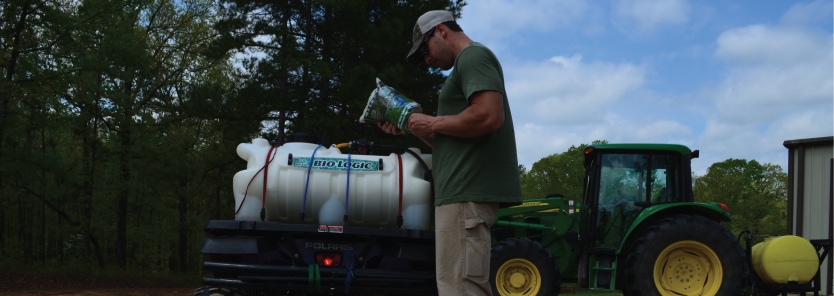No Till Food Plot Projects
Don’t have year round access to a tractor or too wet to use one? Here are 5 no til food plot projects you can still do to continue the progress for your property and critters.
1. Food Plot Soil Testing
Knowing the characteristics of the soil in your no till food plot and tilled food plots not only helps determine the most productive species to plant but gives land managers the information needed to properly amend the soil ensuring a successful, nutritious food plot. Since soil acidity levels are so important in establishing and creating a successful food plot, we have created an easy to use way to test the pH and nutrient status of your soil. By downloading a BioLogic Soil Test and following a few simple steps you can take the guess work out of knowing what your soil needs.
2. Prioritize Projects
What changes would you like to make to your property this growing season? Make a list of what you observed this past hunting season and what you have the ability to change. Increasing food plot size, planting and creating soft mast orchards, creating new bedding and escape cover with native grasses, improve timber stand quality by removing low quality hardwoods are just a few ideas.
3. Perennial Food Plot Maintenance
Clover, alfalfa, chicory that was planted during the late summer/fall is ready to explode out of the ground and so are the weeds. Identify what weeds you are dealing with and put a plan together to get the plots sprayed before the weeds have time to outcompete the perennials. Unwanted weeds and grasses are much easier to control and kill when they are young.
4. Fish Pond Fertilization
Ok ponds aren’t no till food plots but done correctly, a fertilization program using BioLogic Perfect Pond Plus or similar products can double or triple the food production for your pond, significantly impacting the growth/size and health of your fish population. In the northern most states pond fertilization isn’t necessary. However, in the transitional states and throughout the south fertilization should begin during the spring when surface temperatures reach the low to mid- 60s. You want to begin early enough, before the growth of pond weeds begin. Ideally you’ll create an algae bloom so the water doesn’t remain clear. If you wait too late in the spring to fertilize and the lake weeds have begun to grow, you’ll only serve to fertilize those weeds. Increasing the fertility of your lake boosts the basis of the food chain, beginning with single-cell plankton algae.
5. Plant and/or Maintain Mast – Tree Food Plot
Now is a great time of year to get some seedlings in the ground, or observe and maintain trees you’ve planted in the past. While out tending to your food plots, why not perform some weed control around young seedlings and saplings. This will allow your trees to grow free of competition that can slow the growth, especially in the first few years. While visiting your trees apply your favorite tree fertilizer to speed their growth. We like to keep the weeds set back about 3-4 feet from each tree for most of the growing season while they are young. Hopefully you have tree protectors installed around each tree. If so, now is a great time to check for and address any problems such as ant beds, rodent nests, weeds, or accumulating leaves hiding inside the tubes. Nativ Nurseries has seedlings available, and check out their youtube videos for more tree maintenance instruction and ideas.
~
For more from GameKeeper Farming For Wildlife like No Till Food Plot Projects, join our weekly newsletter or subscribe to GameKeepers Magazine. Your source for information, equipment, know-how, deals and discounts to help you get the most from every hard-earned moment in the field.







